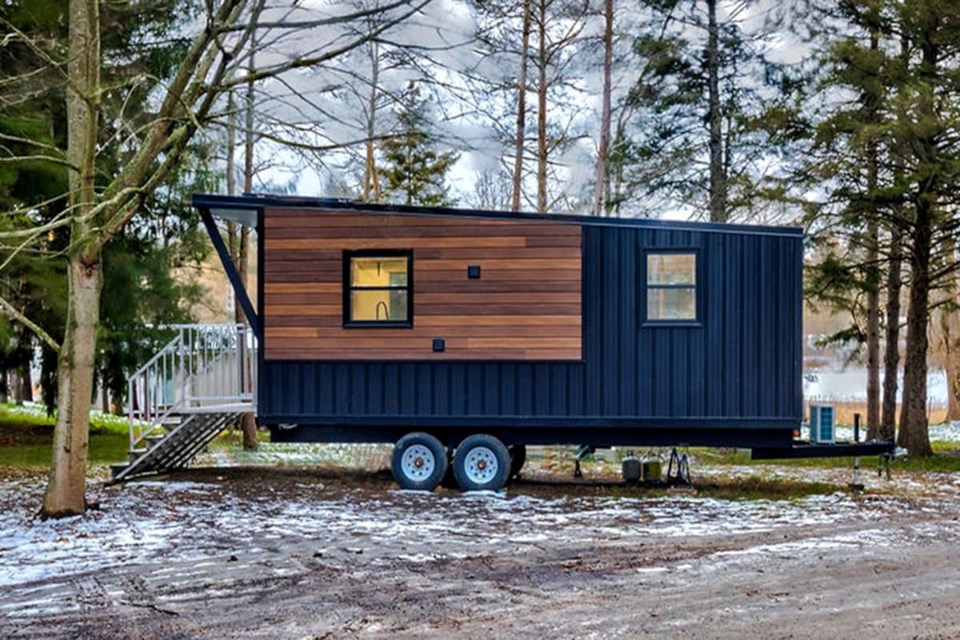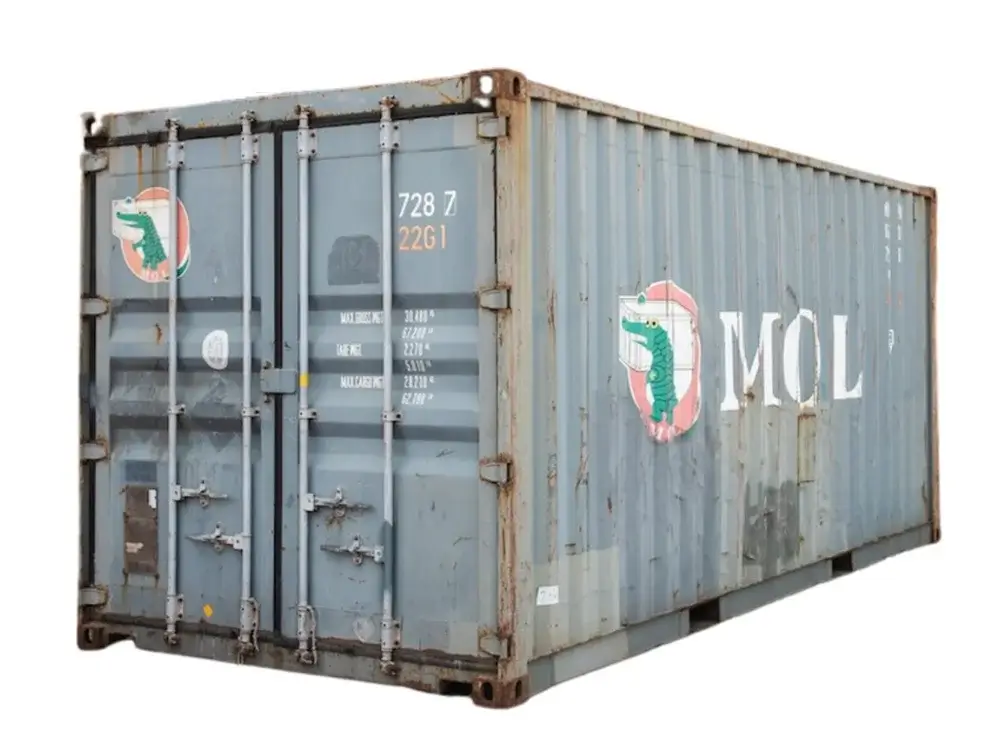Every little thing You Required to Learn About Shipping Containers and Their Practical Applications
Shipping containers have advanced from simple tools for transport to versatile structures with numerous sensible applications. Their durable layout and conventional sizing make them ideal for an array of usages beyond delivery. From ingenious housing services to sustainable farming, their flexibility is notable. The opportunities do not end there. Exploring their various features discloses shocking understandings right into contemporary obstacles and creative services. What other functions could these containers play in today's globe?
The Style and Structure of Shipping Containers

Inside, containers are created to take full advantage of room, usually including wood or steel floor covering that can sustain considerable weight. Air flow systems might be incorporated to avoid wetness accumulation, which is essential for delicate cargo. Additionally, strengthened edges enable for very easy handling by cranes and forklifts, facilitating seamless loading and dumping. This thoughtful layout and structure contribute to the containers' versatility across various shipping and storage space applications.
Advantages of Making Use Of Shipping Containers
While many transport approaches have their advantages, the usage of delivery containers stands out due to their unmatched convenience and effectiveness. Shipping containers provide a standard size, making them very easy to stack and transfer across different settings of transportation, consisting of trucks, ships, and trains. This standardization reduces packing and dumping times, therefore enhancing overall productivity.
Shipping containers are built from long lasting products, supplying durable security for goods throughout transportation. They are protected and weather-resistant, reducing the threat of damages from environmental factors or burglary. Furthermore, the modular style of delivery containers enables for simple customization, making it possible for businesses to adjust them for various objectives, such as storage space or mobile offices.
Their transportability and cost-effectiveness make delivery containers an attractive alternative for companies looking to improve logistics and supply chain procedures. These benefits contribute to the growing popularity of shipping containers in numerous sectors.
Creative Housing Solutions With Shipping Containers
Ingenious housing solutions have emerged as an interesting application of shipping containers, leveraging their intrinsic toughness for household use. These functional frameworks offer a lasting option to traditional structure products, frequently at a fraction of the price. Engineers and developers have actually transformed containers into elegant, functional homes, accommodating varied lifestyles and preferences.

In addition, delivering containers are environmentally friendly, promoting recycling and lowering waste. Lots of projects concentrate on power performance, incorporating environment-friendly roofings and solar panels. As urbanization rises, these cutting-edge housing services present a sensible feedback to housing lacks while cultivating an unique building visual.
Shipping Containers in Retail and Pop-Up Shops
A growing variety of sellers are turning to delivering containers as a vibrant option for retail spaces and pop-up stores. These flexible structures use an affordable alternative to conventional shops, allowing businesses to develop one-of-a-kind, distinctive environments that bring in customers. Their modular layout makes it possible for very easy transport and setup, making them suitable for momentary or seasonal retail places.
Merchants can personalize shipping containers to mirror their brand identity, changing them into aesthetically appealing stores that stand apart in congested markets. The small nature of containers also urges reliable use of space, enabling imaginative formats that maximize consumer circulation and involvement. Furthermore, shipping containers can be situated in unconventional places, such as urban parks or uninhabited great deals, enhancing accessibility and foot traffic.
As the retail landscape advances, shipping containers provide a adaptable and cutting-edge service that meets the demands of modern-day consumers while improving the shopping experience.
Lasting Farming Practices Using Shipping Containers
Sustainable farming practices significantly integrate shipping containers as innovative services for farming - shipping containers for sale near me. These container farms utilize hydroponics to optimize space and resource effectiveness, using a cost-effective strategy to food manufacturing. By transforming delivery containers right into agricultural hubs, farmers can address food security and environmental concerns at the same time
Container Farming Conveniences
While standard agriculture deals with difficulties such as land deficiency and climate change, container farming offers a viable choice that makes the most of area and resources. This cutting-edge method permits year-round crop manufacturing in original site regulated settings, lowering dependence on weather problems. Container farms use less water than standard farming, promoting sustainability and preservation. They can be established in metropolitan areas, bringing fresh fruit and vegetables closer to customers and decreasing transport emissions. Furthermore, the modular nature of shipping containers makes it possible for scalability, allowing farmers to adjust procedures based upon need. Container farming likewise reduces pesticide usage by producing an enclosed environment, inevitably enhancing food safety. As urban populaces grow, container farming becomes a functional option to fulfill the raising need for neighborhood, lasting food sources.
Hydroponics in Containers
Hydroponics, which allows plants to expand without dirt by utilizing nutrient-rich water, flourishes within the boundaries of delivery containers, making it a perfect method for metropolitan farming. These containers develop a controlled atmosphere that maximizes temperature level, light, and humidity, allowing year-round cultivation. With restricted room in urban locations, delivering containers use a scalable option for expanding fresh produce. Hydroponic systems within containers can consist of numerous strategies, such as nutrient movie strategy (NFT) and deep water culture (DWC), which make the most of yield while lessening water usage. This cutting-edge technique not only enhances food security yet also minimizes the carbon impact connected with standard farming techniques. Consequently, hydroponics in containers stands for a forward-thinking remedy for sustainable metropolitan food manufacturing.
Economical Agriculture Solutions
As food production faces boosting challenges due to environment adjustment and urbanization, delivering containers become a cost-effective service for farming. These functional structures can be repurposed for numerous sustainable farming practices, such as hydroponics and upright farming. By using regulated environments within containers, farmers can enhance development cycles and decrease resource consumption, consisting of water and fertilizers. Additionally, shipping containers can be purposefully placed in urban areas, reducing transport prices and enhancing access to fresh fruit and vegetables. Their modular nature permits for scalability, making it possible for farmers to expand operations as demand grows. Repurposing containers adds to lose reduction, straightening with environmentally friendly farming efforts. In general, shipping containers existing cutting-edge opportunities for efficient and sustainable food manufacturing.
Emergency Situation and Disaster Relief Applications of Shipping Containers

Organizations regularly utilize shipping containers to create mobile centers or field health centers, guaranteeing that treatment reaches those in demand. Furthermore, they can be transformed right into command facilities for working with rescue operations, thereby enhancing organizational effectiveness during dilemmas.
Additionally, containers can be changed to keep important products such as garments, food, and water, guarding supplies until they are distributed. Their flexibility allows them to be conveniently moved to different areas, ensuring that help gets here where it is most quickly required. Generally, shipping containers play a pivotal role in boosting the effectiveness of catastrophe useful content alleviation efforts worldwide.
Regularly Asked Concerns
How Are Shipping Containers Transported From One Place to An Additional?
Shipping containers are moved using ships, trains, and trucks, making use of cranes for loading and discharging. This multi-modal click here for more transportation system guarantees reliable movement throughout land and sea, linking international supply chains and facilitating global trade.
What Is the Average Lifespan of a Delivery Container?
The average life expectancy of a shipping container generally varies from 10 to 25 years, depending upon maintenance, usage, and ecological aspects. Correct treatment can extend their use, while forget may result in degeneration and damage.
Can Shipping Containers Be Modified for Various Uses?
Yes, delivering containers can be modified for various uses. They act as homes, offices, pop-up stores, and storage space systems. Their adaptability permits innovative adaptations, making them appropriate for a vast array of applications.
Are Shipping Containers Environmentally Friendly?
Shipping containers can be eco-friendly, as they advertise repurposing and reusing. Their durability decreases waste, while their use in alternate housing and companies decreases the requirement for new materials, contributing to lasting practices.
Exactly how Do I Select the Right Size Shipping Container?
To select the best dimension shipping container, one should examine storage requirements, think about the designated usage, and evaluate area availability - shipping container storage. Typical dimensions include 40-foot and 20-foot containers, each offering numerous storage and transportation demands properly
Cutting-edge housing solutions have actually arised as an interesting application of shipping containers, leveraging their inherent staminas for residential usage. The adaptability of delivery containers enables for imaginative layouts, from single-unit houses to complex multi-container plans. Sustainable farming methods increasingly include shipping containers as innovative options for agriculture. Additionally, the modular nature of shipping containers allows scalability, permitting farmers to change procedures based on demand. Hydroponics, which permits plants to expand without soil by utilizing nutrient-rich water, thrives within the confines of shipping containers, making it a suitable approach for metropolitan agriculture.